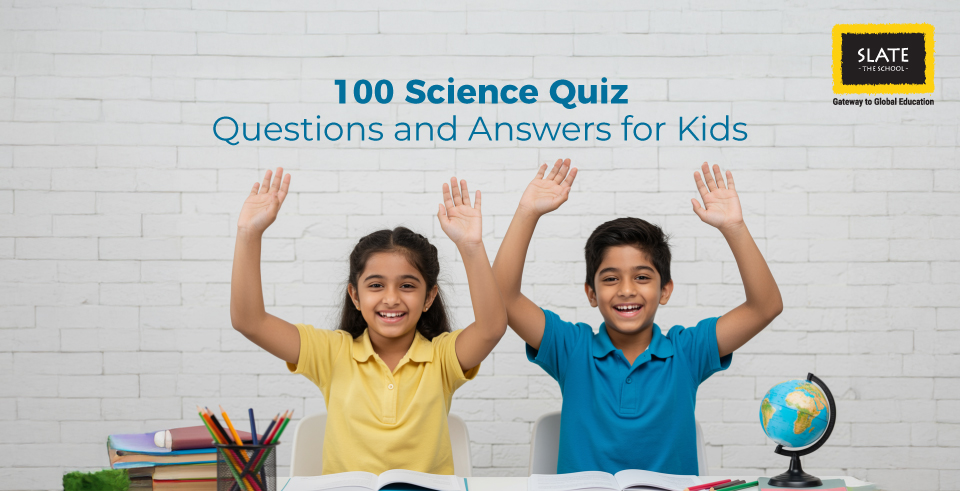Looking for a fun way to test your child’s knowledge? These science quiz questions are ideal for children who enjoy exploring the world around them. Designed to challenge young minds while sparking curiosity, these science quiz questions with answers encompass a wide range of topics, including animals, plants, space, the human body, and more. Let’s dive into 100 exciting questions that make science learning fun and engaging for kids!
- What planet do we live on?
Earth - How many legs does a spider have?
Eight - What gas do plants breathe in?
Carbon dioxide - What is water made of?
Hydrogen and oxygen - Which is the hottest planet in the solar system?
Venus - What do bees collect from flowers?
Nectar - Why don’t we fall off the spinning Earth?
Because gravity holds everything tightly to Earth’s surface. - Why is the ocean salty but rivers aren’t?
Rivers pick up salts from rocks, and they build up in oceans over time. - Which part of the body helps us to see?
Eyes - What colour is the sun?
White (appears yellow from Earth) - Which bird can’t fly?
Penguin - Which organ pumps blood through your body?
Heart - How do airplanes stay in the sky?
Their wings push air down, which lifts them up — it’s called lift force. - What do we call frozen water?
Ice - Which planet is closest to the sun?
Mercury - What do we call animals that eat only plants? Why do we have fingerprints?
To help us grip things better and for unique identity — no two are the same! - What’s the tallest animal in the world?
Giraffe - Which part of a plant is under the ground?
Roots - What do you call baby frogs?
Tadpoles - What shape is the Earth?
Round (sphere) - Why is blood red, and what if it were blue?
Blood is red because of iron in hemoglobin. Some animals do have blue blood! - Which fruit is known for having lots of vitamin C?
Orange - What is the largest planet in our solar system?
Jupiter - What do you call it when water turns into gas?
Evaporation - How many bones are in the human body?
206 - What is the process of a caterpillar becoming a butterfly called?
Metamorphosis - What part of the body helps digest food?
Stomach - What force pulls everything towards Earth?
Gravity - Which gas is most present in the air?
Nitrogen - What do you call animals that live in water and breathe with gills?
Fish - Which planet is known for its rings?
Saturn - How many legs do insects have?
Six - What do you call a scientist who studies rocks?
Geologist - What do plants use to make food?
Photosynthesis - What is a group of stars called?
Constellation - What metal is liquid at room temperature?
Mercury - Which organ is responsible for thinking?
Brain - How long does Earth take to orbit the Sun?
One year - Which vitamin comes from sunlight?
Vitamin D - What kind of energy comes from the sun?
Solar energy - What are animals with a backbone called?
Vertebrates - Which part of the plant makes seeds?
Flower - Which animal is known as the king of the jungle?
Lion - What’s the freezing point of water in Celsius?
0°C - Which simple machine is used to lift heavy loads?
Pulley - What instrument do you use to see tiny objects?
Microscope - Which bird is known for imitating sounds?
Parrot - What causes tides in the sea?
The Moon’s gravity - What’s the name of Earth’s natural satellite?
The Moon - Which natural resource is used to make paper?
Trees - What is the powerhouse of the cell?
Mitochondria - Which part of the atom has a positive charge?
Proton - How many planets are there in the solar system?
Eight - What’s the boiling point of water in Celsius?
100°C - What’s the chemical symbol for gold?
Au - Which scientist discovered gravity?
Isaac Newton - What is the study of weather called?
Meteorology - What does DNA stand for?
Deoxyribonucleic Acid - What are clouds made of?
Water droplets - Which organ helps filter blood in the body?
Kidneys - Which bone protects the brain?
Skull - Which planet is known as the red planet?
Mars - What is the outermost layer of Earth called?
Crust - How many teeth does an adult human have?
32 - Which energy is stored in food?
Chemical energy - Which instrument is used to measure temperature?
Thermometer - What is the hardest natural substance?
Diamond - What causes day and night?
Earth’s rotation - What is the name of our galaxy?
The Milky Way - Which part of the eye controls how much light enters?
Pupil - What is the process of the water cycle’s cooling step?
Condensation - What are the three states of matter?
Solid, liquid, gas - Why do cats’ eyes glow at night?
A special layer in their eyes reflects light, helping them see in the dark. - What do you call plants that grow in deserts?
Cacti - Why do our fingers wrinkle in water?
To improve grip on wet surfaces. - Which travels faster: light or sound?
Light - Why does your heart beat faster when you run?
To send more oxygen to your muscles.
- Which sense do snakes use the most?
Smell - What is the largest internal organ?
Liver - Can plants move on their own?
No - What do bats use to see in the dark?
Echolocation - What is the scientific name of humans?
Homo sapiens - What causes rainbows?
Light refraction - Which gas do humans need to survive?
Oxygen - What is the centre of the atom called?
Nucleus - Which bird lays the largest egg?
Ostrich - How many hearts does an octopus have?
Three - Can sound travel in space?
No - What is a baby kangaroo called?
Joey - What makes up a plant’s “skeleton”?
Stem - What is the fastest land animal?
Cheetah - What’s the smallest unit of life?
Cell - What does a botanist study?
Plants - Which animal can change its colour?
Chameleon - How many continents are there?
Seven - What do you call molten rock that erupts?
Lava - What does the ozone layer protect us from?
UV rays - Do whales lay eggs?
No - What kind of energy does a battery produce?
Electrical energy - What is the longest bone in the human body?
Femur
Conclusion
Learning science doesn’t have to be boring! With these 100 fun and educational science quiz questions with answers, your child can test their knowledge while developing a genuine interest in the subject. These questions are great for classroom activities, home learning, or weekend quizzes. Encourage your children to ask more questions, explore further, and never stop learning, because science is everywhere!

